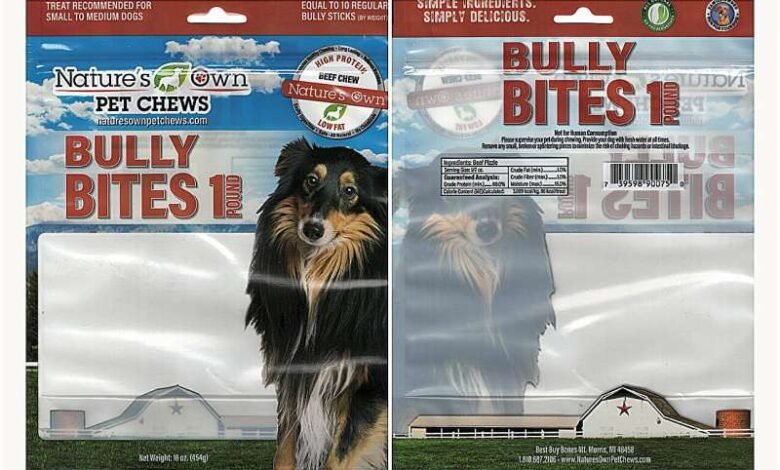We may earn a commission when you click on links across our website. This does not influence our opinions — learn more.
Nature’s Own Pet Chews Pulled From Shelves After FDA Detects Salmonella

A Michigan pet treat manufacturer is grappling with a significant food safety crisis after federal testing revealed dangerous bacterial contamination in one of its popular dog chew products.
Best Buy Bones, Inc., a family-owned company based in Mount Morris, Michigan, announced on October 3, 2025, that it was voluntarily recalling four lots of its Nature’s Own Pet Chews Bully Bites due to confirmed Salmonella contamination — a bacteria that poses serious health risks to both pets and their human handlers.
What Pet Owners Need to Know
The recall affects Nature’s Own Pet Chews Bully Bites packaged in one-pound (16-ounce) resealable plastic pouches with UPC code 739598900750 and an expiration date of September 2027.
The contaminated products bear lot numbers 19379, 19380, 19381, and 19382, with a total of 34 bags distributed from Minnesota to retail stores in Wisconsin after September 23, 2025.
The contamination was discovered during routine FDA testing when samples were collected on September 11, 2025, and subsequently tested positive for Salmonella.
Remarkably, no illnesses in dogs have been reported to date related to this specific recall, though the company has ceased production and distribution while investigations continue.
Arnold McIntyre, the operating officer of Best Buy Bones, Inc., confirmed to Newsweek that the company has “located all 34 bags and are currently waiting for confirmation that they have been properly disposed of”.
Pet owners who purchased the affected products after September 23 are urged to return them to the point of purchase or safely destroy them to prevent access by children, pets, and wildlife.
Understanding the Health Risks
The presence of Salmonella in pet treats creates a dual health threat that extends beyond the animals consuming them.
For dogs, symptoms of Salmonella infection can include lethargy, diarrhea or bloody diarrhea, fever, vomiting, decreased appetite, and abdominal pain.
Perhaps most concerning is that some pets may be asymptomatic carriers, appearing healthy while still shedding the bacteria and potentially infecting other animals or humans.
For humans, the risk comes primarily through direct contact with contaminated products.
Healthy people infected with Salmonella should monitor for symptoms including nausea, vomiting, diarrhea or bloody diarrhea, abdominal cramping, and fever.
In rare cases, the infection can lead to more serious complications such as arterial infections, endocarditis, arthritis, muscle pain, eye irritation, and urinary tract symptoms.
The human health implications are particularly significant given that people can become infected simply by touching contaminated pet food and then touching their mouths, or through contact with contaminated surfaces and utensils.
Research has shown that pet owners are at heightened risk when they fail to practice proper hygiene after handling pet treats or interacting with potentially infected animals.
The Company Behind the Crisis
Best Buy Bones, Inc., operates as a family-owned business that has been manufacturing natural dog treats and chews for nearly three decades from its facility at 7426 N Dort Highway in Mount Morris, Michigan.
The company markets itself as producing premium, all-natural pet treats from the “heartland of America,” emphasizing its commitment to quality and natural ingredients.
However, this recall raises questions about the company’s quality control processes, particularly given the FDA’s stringent zero-tolerance policy for Salmonella in pet foods established in 2013.
This policy emerged after several incidents where humans developed severe illness from contact with contaminated pet food, leading regulators to adopt standards for pet food that are actually stricter than those for farm animal feed.
The company can be reached at (810) 687-2106, Monday through Thursday from 8 a.m. to 5 p.m. EST, for consumers with questions about the recall.
The Bully Stick Manufacturing Challenge
Bully sticks, also known as pizzle sticks, are made from the dried penis of bulls and represent one of the most popular natural dog chews on the market.
The manufacturing process typically involves thorough washing in hot water to remove blood and urine, followed by vertical hanging and slow baking to eliminate remaining odors.
However, this production process presents inherent contamination risks. Studies have found that bully sticks and similar dried meat treats can harbor various bacterial contaminants if not processed correctly.
Research published in the Canadian Veterinary Journal found that 4% of tested bully sticks were contaminated with dangerous bacteria, including Clostridium difficile, MRSA, or tetracycline-resistant E. coli.
The contamination challenge is compounded by the fact that these products are made from animal by-products that must undergo sufficient heat treatment to minimize pathogenic microorganisms.
However, contamination can occur after heat treatment during handling, packaging, or storage phases.
Reputable manufacturers typically test every batch using third-party laboratories specifically for common pathogens including E. coli and Salmonella.
Industry-Wide Contamination Concerns
The Best Buy Bones recall represents part of a troubling pattern affecting the pet food industry.
Since 2017, 44% of pet food recalls have been caused by Salmonella contamination, with 56 out of 126 total FDA-reported recalls during that period attributed to this pathogen.
The persistence of these recalls despite stringent regulations indicates ongoing challenges in maintaining food safety standards across the industry.
The contamination problem extends beyond individual companies.
A recent study analyzing 505 pet treats purchased across the United States found Salmonella in four pig ear treats from Brazil, while three other products contained colistin-resistant bacteria harboring genes that may confer resistance to last-resort antibiotics used in human medicine. This research underscores the global nature of the pet treat supply chain and the various points where contamination can occur.
Particularly concerning is research showing that treats originating from certain regions and sold through specific retail channels may carry higher contamination risks.
Studies indicate that treats purchased from grocery stores and those originating from North America tend to have lower contamination rates compared to products from other sources.
Regulatory Response and Prevention Measures
The FDA maintains a zero-tolerance policy for Salmonella in pet foods, conducting routine testing of products on store shelves and mandating recalls when contamination is discovered.
The agency’s Bacteriological Analytical Manual provides specific testing protocols that manufacturers should follow, though companies can also use similarly validated non-BAM methods.
For manufacturers, the FDA recommends maintaining control of products during testing, using validated cultural methods for Salmonella detection, and implementing adequate treatment processes to reduce bacterial contamination.
The agency may take enforcement action even when manufacturers have previously tested products and obtained negative results, emphasizing that any confirmed positive result should be considered valid.
Recent enforcement actions demonstrate the FDA’s aggressive stance on pet food safety.
In July 2025, the agency issued a warning letter to Answers Pet Food after finding Salmonella and Listeria contamination in multiple product lots, while in February 2022, Pet Center Inc. received a warning letter detailing numerous violations including employees walking on food contact surfaces with contaminated boots and pest infestations throughout manufacturing areas.
Consumer Protection and Safety Practices
Pet owners can take several critical steps to protect themselves and their animals from contamination risks.
The FDA and health authorities recommend thorough handwashing with soap and warm water for at least 20 seconds after handling any pet food or treats.
This is particularly important given that bacterial contamination can be transferred to kitchen surfaces, utensils, and feeding bowls.
Storage practices are equally important. Pet food and treats should be kept separate from human food, stored according to packaging instructions, and handled with dedicated utensils that are washed separately from other dishes.
Pet owners should also be aware that raw or minimally processed treats carry higher contamination risks compared to fully cooked alternatives.
Special precautions should be taken in households with vulnerable individuals, including infants, children under 5, elderly persons, pregnant women, and immunocompromised individuals, who face higher risks of severe complications from Salmonella infection. In such households, some experts recommend avoiding raw animal-product-based treats entirely.
The Path Forward
The Nature’s Own Pet Chews recall serves as a stark reminder of the ongoing food safety challenges facing the pet food industry.
While Best Buy Bones has responded appropriately by voluntarily recalling affected products and cooperating with FDA investigations, the incident highlights the need for continued vigilance throughout the manufacturing and distribution process.
For consumers, this recall underscores the importance of purchasing pet treats from reputable manufacturers that employ rigorous testing protocols and maintaining proper hygiene practices when handling any pet food products.
As the pet food industry continues to grow and evolve, ensuring the safety of products that bring joy to our pets while protecting public health remains a shared responsibility among manufacturers, regulators, and pet owners alike.
The investigation into the source of contamination at Best Buy Bones continues, and the company’s response to implementing corrective measures will likely influence both regulatory oversight and consumer confidence in the brand moving forward.
For now, pet owners are advised to remain vigilant and follow proper handling procedures.

